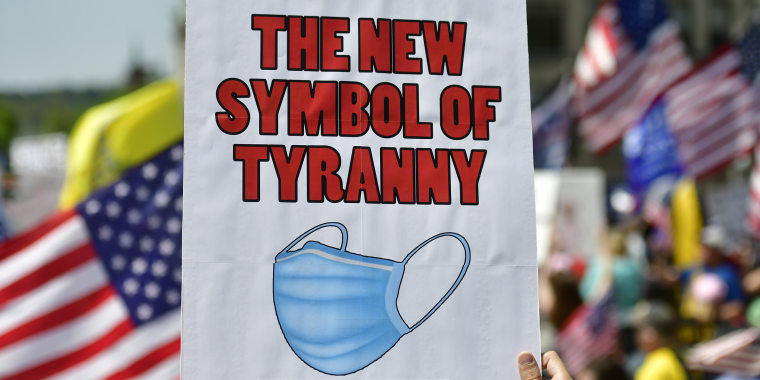Wearing a face mask in public seems like a small step to take to try to prevent the spread of COVID-19, yet many people have been angered to the point of blind rage when asked to do it.
In Florida, a shopper was recorded shoving a Walmart employee. In New Jersey, a man was charged with making terroristic threats when he allegedly became combative after being asked to leave a store. In Texas, a woman started flinging groceries from her cart after reportedly refusing to keep her mask on.
In California, two locations of a taco shop had to close after customers kept berating employees over the restaurant's new mask policy.
Clinical psychologist Joshua Klapow knew some people wouldn’t comply with the new rules, but he’s surprised by the violent reactions seen across the country.
“I wouldn’t have anticipated the intensity at which people are refusing and adamant about not wearing masks,” Klapow, an associate professor of public health at The University of Alabama at Birmingham, told TODAY.
“I would have not anticipated how visceral and vitriol-like it has become.”
So what’s all the fury about? Mental health experts offered a few insights.
People don't like limits on their behavior
“They want to do what they want to do,” said Mark Leary, a social and personality psychologist and professor emeritus of psychology and neuroscience at Duke University in Durham, North Carolina.
A threat to a person’s freedom to behave as he or she wishes leads to “psychological reactance,” or the instant desire to regain that freedom, he noted.
Reactance is often accompanied by anger, though basic differences in people’s personalities and beliefs about the mask issue mean some sullenly comply, others protest then comply, some get angry then leave “and others have full-blown meltdowns that get posted on YouTube,” Leary said.
“I should note that mask-wearers would get equally angry if told they could not wear a mask when they wanted,” he added.
Inconvenience + mixed messages = conflict
Humans don’t like to feel discomfort or inconvenience, so on a basic level, that’s what’s driving some people to skip the masks, Klapow said.
There’s also been lots of conflicting information about the issue, with many health experts, including U.S. Surgeon General Jerome Adams, initially discouraging the general public from wearing face coverings, calling them ineffective. He’s since become a vocal advocate for masks.
“A lot of people are taking bits and pieces they’ve heard and creating a narrative that says, ‘There’s no need for me to wear a mask.’ When you have that narrative and then you’re being told you should, then you have conflict,” Klapow noted.
“We have created such inconsistency in the messaging … that we have created a communication mess — a communication disaster, to be honest with you.”
People hate to be judged, criticized or embarrassed
When others try to limit a person’s perceived freedom to behave as he or she wishes, it often involves judgment or criticism — whether implied or explicit, Leary noted.
“In the case of masks, the message is that you must do the behavior and if you don't, you're inconsiderate, selfish, irrational, uninformed or just plain stubborn,” he noted.
“So part of the anger and aggression is in response to the criticism, devaluation and rejection rather than the simple request to put on a damn mask.”
Being asked to leave an establishment for refusing to wear a face covering is a fundamental change for Americans, Klapow added. It’s also embarrassing, and when people are embarrassed, they tend to lash out, he noted.
People feel powerless
Being asked to wear a mask may remind a person of their parent or boss telling them what to do.
“You can absolutely compare this to a parent-child relationship,” Klapow said. “We immediately have this feeling that our autonomy or our freedom is being taken away.”
Leary imagined someone’s thought process this way: “This other person acts like I'm a child or employee who doesn't have the sense or autonomy to manage my own life!”
Believing that others view you that way is then perceived as a clear signal of devaluation and disrespect, he said.
The rules are inconsistent
Most people aren’t willing to break the law because it has potentially serious consequences. But when it comes to a rule that’s different from place to place — as is the case with mask wearing, with some states implementing mandates, others leaving it up to each business — it creates another source of frustration, Klapow noted. If one store lets you walk in mask-less, you may feel angry that another requires face coverings.
Klapow compared it to seat belt laws. Some people only wear seat belts because they know they’ll have to pay a fine if they don’t — and it’s consistent across the country. “We’re going to need stronger consequences,” for not wearing masks, he added.
How to respond constructively:
If you find yourself furious about having to wear a mask, both experts advised remembering that the situation isn't about others trying to control you.
Keep in mind that people who insist on masks are doing so out of a genuine concern for themselves, others and society in general, Leary noted. There's no reason to be angry at them.
“Do everything you can to look at the people who are refusing you service as people who are trying to uphold the rules they’ve been told to work by. You have to tell yourself, ‘This is not a personal attack on me,’” Klapow noted.
“My stronger message is: If an establishment has a sign that says you must wear a mask to shop here and you enter without a mask then you have absolutely no right to protest being asked to leave … There’s no excuse — none, zero excuse — for creating verbal disturbances in a store where the rules are very clear.”


